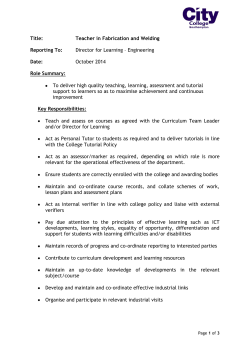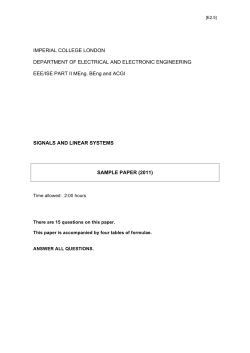
Syllabus & Schedule
ChE 130, Biomolecular Engineering Laboratory, Spring 2015 Course Syllabus Course Description This laboratory focuses on the design, construction, and characterization of engineered biological systems and is comprised of: (i) open-ended research projects emphasizing experimental techniques in biomolecular engineering, (ii) oral presentations, and (iii) written reports of scientific results. The course has two phases – a tutorial phase and a project phase. During the tutorial phase, all students complete the same lab exercises. During the project phase, students work on different research problems in the general areas of biomolecular engineering and synthetic biology. Emphasis is on projects that apply rational design strategies, subject to constraints, toward engineering biological systems that exhibit programmed behavior. Instructors Professor David A. Tirrell office: 225 Spalding phone: x3140 e-mail: tirrell@caltech.edu admin. assistant: Anne Hormann, 221 Spalding Dr. Mike Vicic 117 Spalding x4613 vicic@cheme.caltech.edu Head Teaching Assistant The head teaching assistant leads the tutorial at the beginning of the course and provides support as a technical consultant and expert during the project phase of the course. The head teaching assistant is NOT the primary contact for help, advice or questions during the project phase of the course. Michael Srienc (msrienc@caltech.edu) Project Teaching Assistants Project teaching assistants are your primary contacts during the project phase of the course, and you’ll get to know them during the tutorial phase of the course. Bradley Silverman (bsilverm@caltech.edu) Yong Wu (yywu@caltech.edu) Emily Wyatt (ewyatt@caltech.edu) Reference Materials Course website: http://che130.che.caltech.edu/ Laboratory handouts: Protocols will be distributed as .pdf files via email and the course website. Textbook (recommended): Gene Cloning and DNA Analysis – An Introduction, Sixth edition, T. A. Brown, Blackwell Publishing, 2010. Available in the Laboratory: Molecular cloning: A laboratory manual, 3rd edition, J. Sambook and D.W. Russell, Cold Spring Harbor Laboratory Press, 2001. Available in Millikan Library: Molecular Biology of the Cell, 4th edition, B. Alberts, et. al., Garland Science, 2002. Page 1 ChE 130, Biomolecular Engineering Laboratory, Spring 2015 Course Meeting Times Course Syllabus Lecture: During the tutorial phase, one lecture will highlight background information, current technologies and experimental techniques to support the tutorials and project execution. Plus, project options will be discussed. All Students: 4/1 (Wednesday) 3-4pm in 102 Spalding Project Pre-Proposal: Midway through the tutorial phase, each student will meet with Prof. Tirrell (and maybe others) to verbally discuss their proposed project. Each student will spend 5-10 minutes discussing and providing their rationale for their design strategy, their set of constructs, and their objectives. You don’t need slides, but you should come with a list of constructs (e.g., how many different promoters or ribosome binding sites and the characteristics of the promoter or RBS sequences). Meetings will be scheduled during the following times: All Students: 4/8 (Wednesday) 1-5:30pm in 225 Spalding Project Updates: During the project phase, each student will twice meet with Prof. Tirrell and Dr. Vicic to receive individualized feedback and guidance to achieve project success. Each meeting will be 5-10 minutes in duration, and will tentatively be scheduled during the following times: Seniors: 5/6 (Wednesday) 2-4:30pm & 5/20 (Wednesday) 1-3:30pm in 225 Spalding Juniors: 5/13 (Wednesday) 3-4:30pm & 5/21 (Thursday) 3-4:30pm in 225 Spalding Laboratory: During the tutorial and project phases, students and TAs will be in lab during the scheduled lab times. Two sections are scheduled: Section #1: Mon/Fri, 1-4pm, 16 & 17 Braun Section #2: Tue/Thu, 1-4pm, 16 & 17 Braun Students are only allowed in the laboratory when at least one graduate teaching assistant, staff member or faculty member is present. Because of this restriction, we are currently working through scheduling and resource issues to provide as much lab time as possible during the project phase, but available lab time will be a significant constraint on your design options. As soon as we finalize these additional times – likely 11pm – 1am multiple nights per week – we will announce them, but project lab times will definitely include the lab times shown above. Page 2 ChE 130, Biomolecular Engineering Laboratory, Spring 2015 Course Syllabus Course Outline Weeks 1-3: General Laboratory Training (with recommended reading) You should read and understand the protocols before the lab session and you may want to read the recommended text if you want to learn additional background material. Laboratory: First Meeting (one hour): safety training. Reading: None Tutorial, Day 1 (three hours): growing bacteria on solid media; growing bacteria in liquid culture; isolating plasmid DNA. Reading: Protocols 1, 2, 3 & 4; Brown, Chapters 1, 2 & 3 Tutorial, Day 2 (three hours): amplifying DNA segments through PCR; digesting DNA; analysis of DNA by gel electrophoresis. Reading: Protocols 5, 6 & 7; Brown, Chapters 4 & 9 Tutorial, Day 3 (three hours): ligating DNA; transforming cells. Reading: Protocols 8 & 9; Brown, Chapters 5 & 6 Tutorial, Day 4 (three hours): colony PRC; measuring optical density and fluorescence (time course); sequencing. Reading: Protocols 5, 6, 11 & 12 Lectures: Week 1: Overview, background and description of available projects. General design strategies that can be used for any project in biomolecular engineering, focusing on those applicable to this year’s projects. Weeks 2-10: Laboratory Design Project (Approximate) Week 2, 3 & 4: Design engineered system; order primers; list materials & supplies. Weeks 4, 5 &6: Construction of system. Weeks 7 & 8: Initial system characterization and analysis. Weeks 9 & 10: Additional construction, final system characterization and analysis. Page 3 ChE 130, Biomolecular Engineering Laboratory, Spring 2015 Course Syllabus Grading Scheme Time Management, Preparedness & Results Project Proposal Tutorial Data Summary Project Updates (2) Project Report Project Presentation 20% 7.5% 7.5% 15% 25% 25% Submitting Work Proposals, Plans and Reports: Before 4pm PDT on the due date, send an email to che130submit@caltech.edu with a .pdf of your written work (e.g., proposal; project plans; data summary; project report). Your work will automatically be distributed to both instructors and all of the TAs. Presentations: At least 15 minutes before the start of the presentation period, send an email to che130submit@caltech.edu with a .pdf and a .ppt of your presentation. Your work will automatically be distributed to both instructors and all of the TAs. We will then download all presentations on a single computer so that the presentation periods will proceed quickly. Project Updates: At the beginning of each meeting, or shortly after, you should distribute a handout or submit an electronic file. If you bring a handout, bring two copies – one for each. If you submit an electronic version, email the file to che130submit@caltech.edu. Policy for Late Work • • • There will be a cumulative 10% deduction for every hour an assignment is late. If the assignment is more than nine (9) hours late, the student gets no credit. If an assignment is due at 4:00PM, it is considered: o one hour late (10% deduction) if submitted between 4:01-5:00PM; o two hours late (20% deduction) if submitted between 5:01-6:00PM; o and so on. We will provide extensions for health reasons and family emergencies at any time before the assignment is due. Send an email to Mike Vicic. Extensions for non-emergency reasons (e.g., interviews, athletic trips, etc.) are handled on a case-by-case basis as long as the request is made at least 24 hours in advance of the time the assignment is due. Send an email to Mike Vicic. Page 4 ChE 130, Biomolecular Engineering Laboratory, Spring 2015 Course Syllabus Week 1 SCHEDULE: DAYS, TIMES & DETAILS SUBJECT TO CHANGE (LAST UPDATE 4/1/2015) Monday Tuesday Wednesday Thursday Friday Mar 30 31 2 3 Lab Intro & Safety Training Lab Intro & Safety Training 7 Apr 1 Lecture: Design Strategies & Projects 3-4 PM (102 Spldg) Tutorial, Day 1 Tutorial, Day 1 8 9 10 Pre-Proposal Individual Mtgs. (All) 1-5:30 PM (225 Spldg) 15 NO MEETING Tutorial, Day 3 (w/ Primer Design Tutorial) 16 LAB CLOSED Tutorial, Day 3 (w/ Primer Design Tutorial) 17 LAB CLOSED Week 3 Week 2 6 Tutorial, Day 2 Project Selection Completed (All) 13 Tutorial, Day 2 Tutorial, Day 4 Tutorial, Day 4 OPTIONAL OFFICE HOURS WITH TAS 3-4PM (make appt) 21 22 NO MEETING Project Plan, Pt 1 (Design; Primer Seq.; Construction Plan) (Model-Based Proj) Due: 4PM PDT 29 NO MEETING Project Plan, Pt 2 (Characterization Plan) (Model-Based Proj) Due: 4PM PDT 6 Project Update #1 (Seniors) 2-4:30PM (225 Spldg) 13 Project Update #1 (Juniors) 3-4:30PM (225 Spldg) 20 Project Update #2 (Seniors) 1-3:30PM (225 Spldg) 14 One Page Proposal (All Students) Due: 4PM PDT Week 4 20 23 24 30 Project Plan, Pt 2 (Characterization Plan) (Library-Based Proj) Due: 4PM PDT May 1 7 8 14 15 21 Proj. Update #2 (Juniors) 3-4:30PM (225 Spldg) 22 27 28 4 Tutorial Data Summary (All) Due: 4PM PDT 11 5 18 19 25 LAB CLOSED Memorial Day (Institute Holiday) 26 27 NO MEETING 28 29 Jun 1 2 3 Proj. Presentations (Seniors) 1-6PM (102 Spldg) 4 5 LAST LAB DAY Project Report (Seniors) Due: 4PM PDT 8 9 10 Proj. Presentations Page 5 (Juniors) 3:30-6:30PM (102 Spldg) 11 12 Project Report (Juniors) Due: 4PM PDT Week 5 Week 6 Week 7 Week 8 Week 9 Week 10 Finals Project Plan, Pt 1 (Design; Primer Seq.; Construction Plan) (Library-Based Proj) Due: 4PM PDT 12
© Copyright 2025









